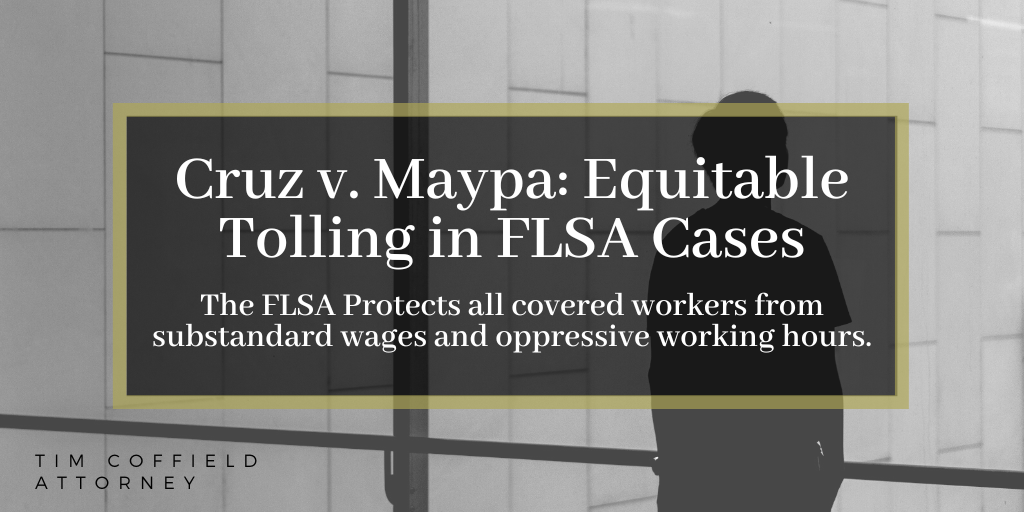
Torres v. Texas Dep’t of Pub. Safety: States Do Not Have Sovereign Immunity Against Damages Claims for Servicemember Discrimination Under USERRA
In Torres v. Texas Dep't of Pub. Safety, 142 S. Ct. 2455 (2022), the Supreme Court held that States do not have sovereign immunity against damages claims for servicemember employment discrimination in violation of the Uniformed Services Employment and Reemployment...

Harbourt v. PPE Casino Resorts Maryland: Fourth Circuit Recognizes Training Can Be Compensable Work Under FLSA
In Harbourt v. PPE Casino Resorts Maryland, LLC, 820 F.3d 655 (4th Cir. 2016) the Fourth Circuit held that under the Fair Labor Standards Act, compensable “work,” for which the FLSA requires employers to pay at least minimum wage, broadly encompasses physical or...

Cummings v. Premier Rehab Keller: Emotional Distress Damages Under the Rehabilitation Act and Affordable Care Act
In Cummings v. Premier Rehab Keller, P.L.L.C., 142 S. Ct. 1562 (2022), the Supreme Court held that emotional distress damages are not recoverable in private actions to enforce the antidiscrimination provisions of the Rehabilitation Act or the Affordable Care Act....

Morgan v. Sundance: Waiver, Prejudice, and Arbitration Under Federal Law
In Morgan v. Sundance, Inc., 142 S. Ct. 1708 (2022), the Supreme Court held that prejudice is not a condition of finding that a party, by litigating too long, waived its right to stay litigation or compel arbitration under the Federal Arbitration Act. Facts Morgan...

Cruz v. Maypa: Equitable Tolling in FLSA Cases
In Cruz v. Maypa, 773 F.3d 138 (4th Cir. 2014), the Fourth Circuit held that the limitations period for claims under the Fair Labor Standards Act was equitably tolled because the employer failed to post the required notice explaining workers’ rights under the FLSA....

Conner v. Cleveland County: Fourth Circuit Recognizes Overtime Gap Time Claims Under FLSA
In Conner v. Cleveland County, N. Carolina, 22 F.4th 412 (4th Cir. 2022), the Fourth Circuit held that the overtime provisions of the Fair Labor Standards Act (“FLSA”) allow claims for “overtime gap time.” Overtime gap time refers to a particular type of wage-payment...

United States v. Darby: Commerce Clause, Manufacturing, and the FLSA
In United States v. Darby, 312 U.S. 100, 61 S. Ct. 451 (1941), the Supreme Court held that Congress had power under the Commerce Clause of the Constitution to enact the Fair Labor Standards Act (“FLSA”). The Court held that the Commerce Clause permitted Congress,...

Garcia v. San Antonio Metro: Application of the FLSA to State and Local Governments
In Garcia v. San Antonio Metro. Transit Auth., 469 U.S. 528, 105 S. Ct. 1005 (1985), the Supreme Court held that Congress had power under the Commerce Clause to apply the Fair Labor Standards Act to a municipal transit authority. The case is important because it...

Perez v. Mortgage Bankers: DOL Powers and Overtime Protections for Mortgage Loan Officers
In Perez v. Mortgage Bankers Ass'n, 575 U.S. 92, 135 S. Ct. 1199 (2015), the Supreme Court held that an agency, like the Department of Labor, is not required to use notice-and-comment procedures when it wishes to issue a new interpretation of a regulation that...

Mitchell v. Kentucky Finance Co.: Overtime Protections for Loan Officers
In Mitchell v. Kentucky Finance Co., 359 U.S. 290 (1959) the Supreme Court held that the business of making personal loans to individuals does not constitute "sales of . . . services" by a "retail or service establishment," within the meaning of the retail and service...
